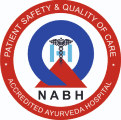



Are you constantly battling the discomfort of GERD? It’s time to break free from the cycle of acid reflux and heartburn!
AyurVAID Hospitals is now a part of Apollo Hospitals Group.
Gastroesophageal Reflux Disease or GERD as it is normally called is a condition that ails the upper gastrointestinal tract. It is a chronic disease in which the stomach contents are backwashed to the esophagus, the long narrow tube that connects the oral cavity with the same. GERD occurs when the lower esophageal sphincter, a valve that controls the passage of food from the esophagus to the stomach, fails to close.
Prevalence is more in Europe, the Middle East, and the Americas, and is linked with old age. Lifestyle modifications, diet maintenance, and rarely surgery are the prescribed management options.
AyurVAID is India’s 1st Ayurveda hospital to be accredited by NABH (National Accreditation Board for Hospitals & Healthcare Providers), Quality Council of India.
Agnimandya or impaired digestive fire can be cited as the reason for Amlapitta. This affects annavaha srotas (the passages that carry food) as a whole and causes symptoms like avipaka (indigestion), klama (unexplained tiredness), amlodgara (sour belching), heaviness of the body, burning sensation of throat, hrit shula (chest pain), etc. The probable causes described in the texts like Charaka Samhita are adhyashana (eating before the previous meal has been digested), viruddhahara (contradictory food), ati drava (drinking excess fluid), ati amla (acidic food), ati tikshna (foods of sharp potency), pungent drinks, akala bhojana (untimely eating), ati snigdha (fatty diet), ati ruksha (dry foods), excessive fasting, madya sevana (alcoholism), day sleep after meals, vega dharana (suppressing natural urges), etc.

Panchakarma procedures such as vamana and virechana can be done to eliminate the doshas of the upper gastrointestinal and lower gastrointestinal tracts respectively. Breathing exercises like Pranayama are proven to relieve symptoms of GERD.
The signs and symptoms of a person suffering from Gastroesophageal Reflux Disease (GERD), include:
Ayurvedic treatments aim to alleviate symptoms like heartburn, regurgitation, and chest pain associated with GERD.
Ayurveda focuses on improving digestive fire (agni) to promote better digestion and prevent acid reflux.
Ayurvedic practitioners assess the individual's dosha (body type) to identify the underlying imbalances contributing to GERD
Ayurveda tailors treatments to the individual's unique constitution, addressing their specific needs.
Ayurvedic dietary guidelines help identify foods that aggravate GERD and suggest foods that support digestion.
Ayurveda emphasizes lifestyle changes like stress reduction, regular exercise, and adequate sleep, which can positively impact GERD.
Ayurvedic therapies may include Panchakarma, a detoxification process, to eliminate toxins and restore balance.
Ayurveda aims for sustainable results by addressing the root causes of GERD and promoting overall health.
Successful Ayurvedic treatment may reduce the need for long-term dependence on medications for GERD management.
We work towards whole person health through classical Ayurveda science. Our Ayurveda case studies are the first-line evidence in Ayurvedic medical literature as they present the original observations from our Ayurveda practitioners. The case studies are published taking patient’s consent and maintaining patient anonymity.